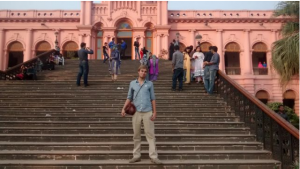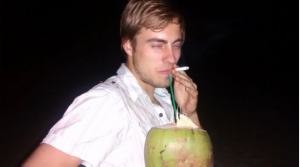My travels have recently taken me along the aptly named Bay of Bengal across much of the territory of the former British province of Bengal, nowadays divided into West Bengal in India and the country of Bangladesh.
During my stay in the old British capital of Calcutta (Kolkata) I visited the magnificent Victoria memorial, hung out with two awesome Danish guys and attempted to gather information regarding the visa requirements for Bangladesh, and I swiftly realised this was the path less trodden. All I needed to know, really, was whether the Visa-on-arrival mentioned on the website was also issued at land ports to tourists complying with the necessary requirements.
The various officials who answered the phone at the Bangladesh Embassy of the Bangladesh High Commissioner, however, delighted in being rude, curt and misleading to the point of exasperation. My question was answered differently every time, except the last time when they simply hung up when it became evident it was me again. The next morning I went there in person. The embassy was not where it was supposed to be. I was not allowed inside for some information: instead I was referred to one of the three visa windows opening up to the street, two of which were Indian citizen only. After some diligent waiting/elbowing in line I was allowed to ask one question, which was answered incompletely after which I was supposed to get in line again. Taking advantage of my considerable height (this is India after all) I managed to cling on to the window long enough to get my questions answered, if incompletely and incorrectly: taking the bus to Bangladesh would have to be a gamble.
First I signed up for a boat ‘adventure’ through the Sunderbans, the world’s largest mangrove forest and home to the elusive Bengal tiger. With two cheerful Australians and a retired Indian couple I enjoyed the great food, chilled on the boat, played guitar and drank whiskey for two days, compensating for the fact that zero wildlife showed up for us to admire.
Another day was dedicated to running missions for Lars de Rijck, who had a list of people who had been important to him during his stay in Calcutta a year earlier with whom I took pictures and to whom I gave some financial help. On the street I met mister Islam from Bangladesh, who, upon hearing I would be visiting his country, had tea with me and made me promise to stay at his house.
At the Bangladesh border, the officials were flabbergasted by the lack of a visa in my passport and my insistence there was something called a visa on arrival for which I was elligible. After a lot of kastje naar de muur I received my visa, apparently setting a precedent.
Late at night I reached Dhaka, and to my consternation the average affordable hotel there does not accept foreigners! With help of a bus attendant I stayed at a luxurious resort for an astronomical price (about 30 euros). To my delight I was given the only room with a bathtub, although the bath plug was conspicuously absent. Upon my informing him, the night manager cheerfully started hammering a earthenware teapot lid in shape, which proved to be in vain as there turned out to be a crucial lack of hot water. To bed feeling very alienated.
My friend from the bus helped my find a more affordable hotel at a reasonable price through some contacts, which is key to doing anything in Bangladesh. Immensely overpopulated (the population of Russia on a stretch of land half the size of Poland) and intensely corrupt, Bangladesh suffers from strong poverty and undeveloped infrastructure, making travel across the capital Dhaka (14 million jam-packed souls) a matter of great patience. There are no taxis and few cars in general, the vast majority of the traffic being rickshaws with some tuktuks (locally called CNGs) and trucks sprinkled in between.
Through mister Islam I met the high society and I spent time going to nice restaurants, playing pool, visiting one of those notorious garments factories, hanging out with businessmen, speeching at a private school and having a meeting with the CEO of Bestway Group among many other things. To explain this change of fortune, it is necessary to know that as a western tourist you are such a rarity, such a precious curiosity, that people almost stand in line to host you and spend some time with you, at every level of society. Having spent some days as a temporary socialite, I went with my friend from the bus company to the little jungle village where his parents lived. Travelling by boat and by CNG, we reached the village at night where I was a complete superstar. Eating my meal indoors, the curious were packed three lines thick in front of the windows to catch a glimpse of this white man who is from one of the fabled European countries. I enjoyed a motor ride through the jungle seeing some crumbling British ruins, occasional settlements and (unsurprisingly) many trees.
Travelling onwards to Chittagong, the second city and biggest port, I was received by Himu, a motorcycle daredevil and school teacher who showed me around town, shared some hash, made me attend a local council meeting and led me to many sights in the city. Stayed with his lovely family for a few days before reaching the zenith of my trip here: the coral island of St. Martin’s, where I chilled out, enjoyed the pristine beaches and befriended a local restaurant owner who took me for a nights’ camping at a tidal peninsula enjoying some smuggled booze, fried crab and a star-studded night sky. This penchant for writing long eloquent sentences might be getting out of hand a bit. The featured picture is me bravely draining a coconut and smoking a cigarette.
At the time of writing back in Chittagong, going back to Dhaka and Kolkata before flying to the destination of my final two weeks: Bangkok, Thailand!



